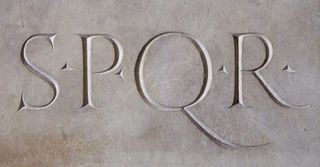Book progress
I am now on chapters 6, 7 and 8 of my Roman history book. I say all three together, because they all deal with the late Republic, from the destruction of Carthage and Corinth in 146 BCE up to the assassination of Julius Caesar in 44 BCE.
I had been intending to explore it in just two chapters, but then it struck me that this period was the first time that we can get a really clear view of some real Romans in detail, and that I had to linger a little longer. So the idea is to call chapter 8 something like "A day in the life" and use that to think about some of those details of family, travel, housing, business, slaves, friendship, intellectual pleasures, art etc that you can extract out of (mainly) Cicero. It is still largely a toff's viewpoint, but it is so much more personally and deliciously detailed than anything available earlier, that it cant just be skipped over. There will be plenty of occasion towards the end of the book to try to see a bit more into lives of the "ordinary" people.
That means 6 and 7, without being drearily dry, will be covering politics (broadly defined) of the period.
It's hard to know how to do the Late Roman Republic in a fresh way. It's something I often teach, so have plenty up my sleeve to say. But having another look at the stuff in the last couple of weeks makes me think that I have been missing a trick. What has struck me is how smart some of these late Republican politicians were. OK I know that, with the benefit of hindsight, the whole system was going down the tubes. I know there were periods of murderous anarchy. I know that we are usually taught to deplore (or at least tut tut at) the disintegration of the political process. But equally there's some really splendid Roman analysis and attempts at reform on show.
What has struck me most is one of the areas of Roman political life usually most deplored: provincial government. Almost everything there is to read tells you that Roman rule overseas was more or less unbridled rapacity. So indeed some of it must have been. But there is another way to see it too. In the transition between an empire of conquest (smash and grab, without annexation) and an empire of government and territorial control -- that is between about the late third and early first centuries BCE -- Rome had to invent a system of imperial rule and provincial administration without any precedents or models to look to. What surprises me is not that some Roman governors in the first century BCE still operated with the old smash and grab conquest model of imperial rule and took all they could get, but that Rome had so quickly tried to establish a legal procedure for giving the provinicials redress in cases of extortion (even if its efficacy got undermined by internal political disputes), and that a sense of "proper" administration arose so quickly in response to exploitation and its discontents.
I was particularly struck by the Extortion Law of Gaius Gracchus in the 120s BCE (sorry I can find no easy link to the text or a discussion) which is almost certainly the law preserved on a bronze inscribed tablet known as the Tabula Bembina. It stretches to several pages in a modern printed text and it lays out procedures for prosecuting those Romans who have been on the take, down to precise instructions about how the final votes are to be cast (to ensure secrecy) and a rudimentary form of legal aid for the provincials trying to bring their case against the imperial power.
It gives a rather different view of the provincial process from the much more famous set of (largely undelivered) speeches of Cicero against Verres, which are somehow usually assumed to give a terrible but reasonably true glimpse of Roman conduct overseas -- and which I am minded to have a bit of a go at in the course of these chapters. What would the defence of Verres have looked like?
Dont worry, this isn't going to be a Niall Ferguson style of apologia for empire (if that's not being unfair to Ferguson...). But I do want to think a bit harder about what the invention of the Roman empire meant, about what it was they were inventing, with what aims and safeguards as well as failings.
Mary Beard's Blog
- Mary Beard's profile
- 4110 followers




